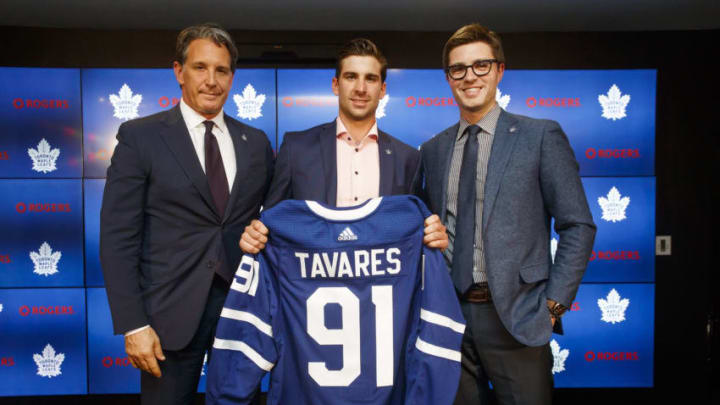While baseball players can expect contracts in the hundreds of millions, professional NHL contracts are nowhere near that. Most likely, they won’t ever reach that level.
It was the sports contract heard around the world as Mike Trout of the Los Angeles Angels signed a 12 year contract extension for $430 million. It’s the richest contract in sports history. Just how much money is that? That’s more than the Nashville Predators, Carolina Hurricanes, Winnipeg Jets, Buffalo Sabres, Columbus Blue Jackets, Florida Panthers and Arizona Coyotes are worth individually as NHL franchises.
Speaking of the NHL, with contracts in the hundreds of millions of dollars becoming commonplace in other professional sports, why not hockey? Why doesn’t hockey see players signing “baseball” value contracts? What’s holding the NHL back?
More from Puck Prose
- Detroit Red Wings 2023 Rookie Camp Has Plenty of Ups and Downs
- This Columbus Blue Jackets rookie doesn’t want to be forgotten
- 2 trades the Boston Bruins must make to secure the Stanley Cup
- 3 reasons the Avalanche won’t win the Stanley Cup in 2024
- This is a big year for Alex Turcotte and the Los Angeles Kings
The short answer, of course, is money. Major League Baseball earns more money in a year than the National Hockey League, and that’s no secret. The actual difference between the two is staggering.
Major League Baseball as an organization brought in over $10 billion during the 2018 season. Meanwhile, the NHL brought in $4.6 billion, less than half of baseball’s amount.
The lowest valued MLB team, the Tampa Bay Rays, is worth $900 million. Conversely, the average value of an NHL franchise is noticeably lower at $630 million. Even though it was quite obvious to the average sports fan baseball earned more money, the real numbers show the disparity between the two to be greater than you could imagine.
League revenue is the basic overall reason the baseball players get paid more, but there is more to it. The NHL’s own rules and regulations help further that gap compared to a more lenient Major League Baseball.
Hockey infamously has a hard salary cap, as well as a salary floor, dictating teams must spend between the two amounts. Any amount over or under is subject to punishment from the league. Also in that salary cap is a max salary per year a team can give to a player. As of the current season, that amount is fixed at $15.9 million.
Baseball is much more of a free for all when it comes to signing players. Their league has no fixed salary cap, but instead a luxury tax, which kicks in when teams spend over a certain amount. As long as teams pay the luxury tax, they are free to spend however much they want. When an MLB team wants to sign a player, all they have to ask is “can we afford this?” When NHL teams want to sign a player, they have to ask “can we afford this, and will the league allow this?”
Even if the NHL reaches the fan levels of Major League Baseball, there is still one underlying factor that’s would prevent baseball type revenue and baseball-type contracts – Canada. While Canada’s the largest country for hockey in terms of international markets, it complicates the revenue process. Whereas MLB is headquartered in the United States and collects revenue while paying put player salaries in United States Dollars, a large portion of NHL revenue is collected in Canadian dollars.
After being collected, it’s measured and paid out in American dollars. The fluctuations between the two currencies negatively affect revenue and player salaries in a way that the league has implemented escrow payments in players contracts, with an amount being withdrawn from player salaries to make up for revenue disparages. Entering negotiations for a new Collective Bargaining Agreement in a few years, the escrow payments are a largely contested issue by the NHLPA.
The currency change may not be the only reason the NHL makes less, but it is a major roadblock that all but prevents it from ever reaching MLB levels. It’s already been a major reason that in the recent NHL expansion, no new teams were granted to Canadian cities, even though Quebec City emerged as a major, and logical, contender.
Should the NHL be worried watching MLB dish out these record-breaking contracts? Probably not. For the most part, there has been internal labor peace with the salary cap continuously rising each season. Having the salary cap and floor directly tied to league revenue was a smart move on the NHL’s part. More importantly, player concerns seem to be about improving their current structure and the problems unique to the NHL, especially escrow. They can’t use MLB as an example to fix the problem that actually affects them.
If you want to be the next multi-hundred million dollar athlete, I hate to break it to you but hockey might not be the sport for you. Go hit the batting cage and hope an owner with deep pockets and a 162 game schedule finds you instead.
